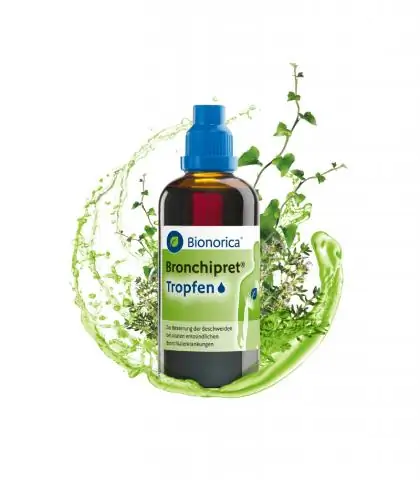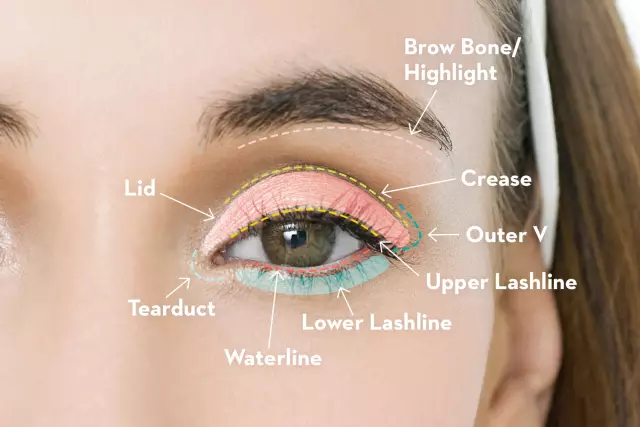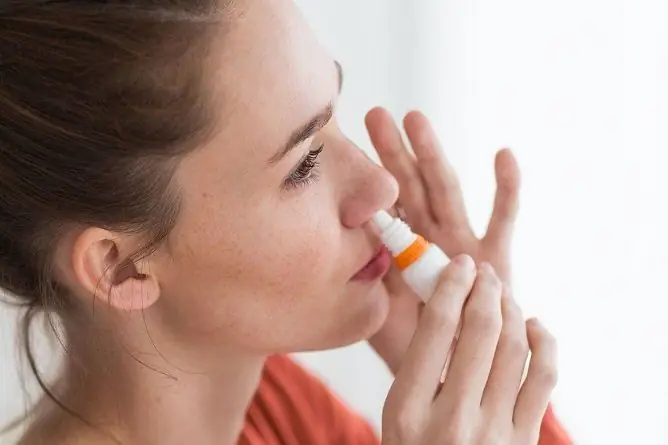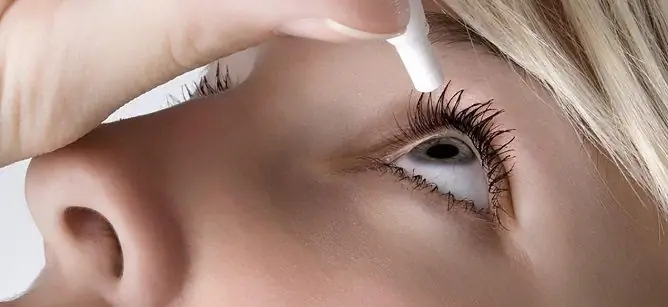- Author Rachel Wainwright wainwright@abchealthonline.com.
- Public 2023-12-15 07:39.
- Last modified 2025-11-02 20:14.
Visin Allergy
Vizin Alerji: instructions for use and reviews
- 1. Release form and composition
- 2. Pharmacological properties
- 3. Indications for use
- 4. Contraindications
- 5. Method of application and dosage
- 6. Side effects
- 7. Overdose
- 8. Special instructions
- 9. Application during pregnancy and lactation
- 10. Use in childhood
- 11. In case of impaired renal function
- 12. Use in the elderly
- 13. Drug interactions
- 14. Analogs
- 15. Terms and conditions of storage
- 16. Terms of dispensing from pharmacies
- 17. Reviews
- 18. Price in pharmacies
Latin name: Visine Allergy
ATX code: S01GX02
Active ingredient: levocabastine (Levocabastine)
Manufacturer: Famar A. V. E. (Famar AVE) (Greece)
Description and photo update: 2019-11-07
Prices in pharmacies: from 165 rubles.
Buy

Vizin Alerji is an antiallergic drug for topical use in ophthalmology.
Release form and composition
The drug is produced in the form of eye drops 0.05%: a homogeneous suspension of white color (4 ml in a low-density polyethylene bottle with a drip device and a high-density polyethylene screw cap with first opening control, in a cardboard box 1 bottle and instructions for use Vizin Alerji).
1 ml drops contain:
- active ingredient: levocabastine hydrochloride - 0.54 mg, which is equivalent to levocabastine in an amount of 0.5 mg;
- additional components: sodium hydrogen phosphate, propylene glycol, hypromellose (2910 3 mPa.s), sodium hydrogen phosphate monohydrate, polysorbate 80, disodium edetate, benzalkonium chloride (in the form of a 50% solution), water for injection.
Pharmacological properties
Pharmacodynamics
Levocabastine is an antiallergic agent that is a selective blocker of H 1 -histamine receptors with a long-term effect. The local effect demonstrated by the drug occurs within 5 minutes. The active substance provides the elimination of the typical symptoms of allergic conjunctivitis, such as lacrimation, redness, itching, swelling of the eyelids and conjunctiva. The effect of Visin Allerji can be observed for 12 hours.
Pharmacokinetics
After instillation of eye drops at a dose of 15 μg / drop, approximately 6 μg of levocabastine is absorbed. The maximum concentration (C max) in blood plasma is reached on average after 6 hours. The active substance binds to blood plasma proteins by 55%.
The main metabolic product of levocabastine is acylglucuronide, which is formed by glucuronidation, the main pathway for the formation of metabolites of the active substance. The agent is excreted mainly by the kidneys unchanged (approximately 70% of the absorbed dose), the half-life (T ½) is approximately 39-70 hours.
Indications for use
Vizin Alerji is recommended for the treatment of allergic conjunctivitis.
Contraindications
Absolute:
- lactation period;
- age up to 12 years;
- wearing contact lenses;
- hypersensitivity to any of the constituents of the drug.
Relative (Vizin Alerji eye drops are used topically, should be used with caution):
- functional disorders of the kidneys;
- elderly age;
- pregnancy (only if the expected benefit to the mother exceeds the possible risk to the fetus).
Vizin Alerji, instructions for use: method and dosage
Eye drops Vizin Alerji are used topically.
Adults and adolescents over 12 years of age are advised to inject the drug into each eye 1 drop 2 times a day (if necessary, 3-4 times a day). Therapy should be continued until the symptoms of the disease are relieved.
Eye drops are a suspension, so shake the bottle with the drug before each instillation.
To administer drops, remove the cap from the dropper bottle and turn it over. Care should be taken to avoid contact of the drip tip with any surfaces. After instillation, it is required to close the dropper bottle with a screw cap.
Side effects
An undesirable phenomenon that was recorded during the clinical studies of Vizin Alerji was eye irritation.
According to the results of post-marketing observations, the side effects of the antiallergic agent include the following effects:
- organ of vision: often (≥ 1/100 and <1/10) - blurred vision, pain in the eye area; infrequently (≥ 1/1000 and <1/100) - eyelid edema; with an unknown frequency (the available data do not allow us to accurately assess the frequency of the side effect) - lacrimation, itching, burning sensation, eye redness, blepharitis, conjunctivitis;
- systemic reactions: often - headache; with an unknown frequency - urticaria, contact dermatitis, allergic reactions, angioedema.
Overdose
Symptoms of an overdose in case of accidental oral intake of Vizin Alerji drops can be pronounced sedation, tachycardia, and a decrease in blood pressure. With the development of these symptoms, forced diuresis is prescribed.
special instructions
To avoid microbial contamination, do not touch the eyelids with a pipette, and after instillation, the bottle should always be tightly closed.
During the period of therapy, it is not recommended to use soft (hydrophilic) contact lenses due to their possible interaction with benzalkonium chloride included in the composition of the drug.
If the drug has become unusable or its shelf life has expired, do not pour out the suspension. The eye drops should be placed in a bag and put into the trash can.
Influence on the ability to drive vehicles and complex mechanisms
Visin Alerji does not have a negative effect on the speed of psychomotor reactions and concentration of attention, therefore it can be used by patients driving a car or working with other complex equipment.
Application during pregnancy and lactation
In the course of preclinical studies on animals with systemic administration of levocabastine in doses up to 2500 times (in terms of mg / kg) exceeding the recommended maximum dose for topical use in humans, no embryotoxic and teratogenic effects caused by the drug were recorded. With systemic use of levocabastine in animals in doses exceeding (in terms of mg / kg) more than 5000 times the recommended maximum dose for topical administration in humans, teratogenic properties and / or an increase in embryo death were revealed.
There are no data on levocabastine therapy in pregnant women. During pregnancy, the use of Vizin Alerji is recommended only in cases where the intended benefit to the woman outweighs the possible threat to the health of the fetus.
Levocabastine is excreted in breast milk, therefore, breastfeeding should be avoided during the period of drug treatment.
Pediatric use
Drug therapy in children under 12 years of age is contraindicated.
With impaired renal function
In the presence of functional disorders of the kidneys, Vizin Alerji should be used with caution.
Use in the elderly
Elderly patients are recommended to use drops with caution.
Drug interactions
The interaction of Vizin Allerji with other substances / agents has not been studied.
Analogs
The analogues of Vizin Alerji are Allergodil, Reactin, Histimet, Tizin Alerji, etc.
Terms and conditions of storage
Store out of the reach of children at a temperature not exceeding 25 ° C.
Shelf life is 2 years. After the first opening of the bottle, the drug should be used within 30 days.
Terms of dispensing from pharmacies
Available without a prescription.
Reviews about Visin Alerji
According to reviews of Vizin Alerji, found on medical sites, it is an effective remedy that quickly eliminates the symptoms of allergic conjunctivitis in the form of lacrimation, itching, redness, excessive dryness or swelling of the eyelids and conjunctiva. Patients note that the drug is not addictive, and its effect in most cases is noted within 5 minutes after instillation. Many people think that the dropper bottle is quite convenient to use.
The disadvantages of the drug, some patients refer to a short, within 2-3 minutes, burning sensation that occurs after the introduction of drops.
Price for Visin Alerji in pharmacies
The price for Vizin Alerji, eye drops, can be 320-420 rubles. for a 4 ml dropper bottle.
Visin Allergy: prices in online pharmacies
|
Drug name Price Pharmacy |
|
Vizin Alerji 0.05% eye drops 4 ml 1 pc. RUB 165 Buy |
|
Vizin Alerji eye drops 0.05% 4ml 336 r Buy |

Anna Kozlova Medical journalist About the author
Education: Rostov State Medical University, specialty "General Medicine".
Information about the drug is generalized, provided for informational purposes only and does not replace the official instructions. Self-medication is hazardous to health!






